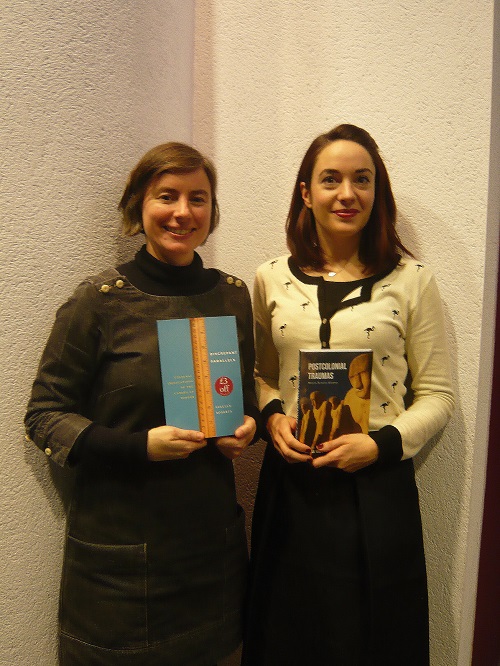
December 22, 2015, by Sunita Tailor
Book Launch: Postcolonial Traumas and Discrepant Parallels
This blog post was written by Dr Abigail Ward on the launch of her edited book Postcolonial Traumas: Memory, Narrative, Resistance.
The last week of term saw the double launch at Blackwell’s bookshop of Dr Abigail Ward’s edited collection Postcolonial Traumas and Discrepant Parallels by Dr Gillian Roberts (School of American and Canadian Studies). Postcolonial Traumas comprises essays on postcolonial literature, memoir, film and graphic novels from Palestinian, Caribbean, African American, South African, Maltese, Algerian, Indian, Australian and British writers, directors and artists. As a collection, these essays necessarily share some important concerns regarding past, current and even future traumas facing the postcolonial world, but they also recognise the diversity of traumatic experiences, and authors are attentive to the specifics of location, historical and cultural contexts. The plural ‘traumas’ is important in recognising the diversity of traumatic experiences in the postcolonial world. Contributors write about such issues as apartheid, slavery, Indian indenture, incest, domestic abuse, 9/11, Palestinian and Israeli conflict, asylum and trafficking, and settler guilt. As well as tracing the various methods of representing postcolonial traumas, the creative works surveyed in this collection, importantly, also explore different modes of resistance to trauma. The idea for this collection began in 2012, with a conference organised by Dr Ward in Nottingham, also called ‘Postcolonial Traumas’.
Gillian Roberts’s book Discrepant Parallels explores the Canadian-US border in travel writing, fiction, poetry, drama, and television. Tracing cultural production in Canada since the 1980s through the periods of FTA and NAFTA negotiations, and into the current, post-9/11 context, Dr Roberts engages with the border’s changing relevance to Canadian nationalist, Indigenous, African Canadian, and Latin American perspectives. Drawing on Kant and Derrida, she theorises the 49th parallel to account for the imbalance of cultural, political, and economic power between the two countries, as well as the current challenges to dominant definitions of Canadianness.
Further information about the books can be found here:
Postcolonial Traumas:
www.palgrave.com/page/detail/postcolonial-traumas-abigail-ward/?isb=9781137526427
Discrepant Parallels:
www.mqup.ca/discrepant-parallels-products-9780773545069.php
No comments yet, fill out a comment to be the first


Leave a Reply